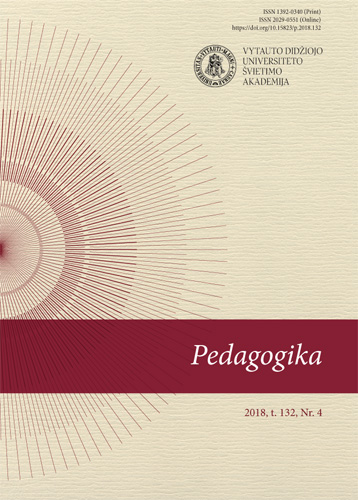Tėvų edukacija vaikų kūrybiškumui ugdyti šeimoje
Parent’s Education for Child’s Creativity Development in the Family
Author(s): Aldona Mazolevskienė, Aušra BurbienėSubject(s): Education, Family and social welfare
Published by: Vytauto Didžiojo Universitetas
Keywords: Creativity; parent’s education; educational environment; education in the family;
Summary/Abstract: Children’s creativity is most visible in the earliest stages, consequently the family role in the formation of a creative and responsible personality is extremely important. The family can meet children’s interests and needs in the best way, as different situations that stimulate a creative thinking may arise in contact with a child when his or her artistic freedom is guaranteed. It is observed that education institutions give little attention to the education of parents, to their involvement into children’s educational processes and promotion to develop children’s creativity at home. It is evident that families lack the experience and targeted counselling (experiential learning) for increasing children’s originality and the originality stimulating environment at home. In order to evaluate the role of parents in the development of creativity-stimulating environment the objective of the study was specified – to learn how children’s creativity is cultivated in a family and in a favourable educational environment. Scientific literature analysis was performed when reviewing the concept of creativity, creativitypromoting activities and the family function in education of creativity. In order to reveal parents’ and children’s experience gained during the creative afternoons the formalized interview was used. Parents’ opinions and evaluation of creative activity importance were revealed with the help of this method. In order to observe children’s creative activity, when interacting with their parents during the creative afternoons, the observation in natural environment method was used. Children expressed themselves naturally acting free in a creative activity. Observation data were video registered. A case study method was applied for discovery of the chosen family home environment that influences children’s creativity. The description (characteristics) of the family home environment were prepared. Qualitative data analysis was done based on deep qualitative interviews and observational data, and on the interpretation of qualitative study results. The study revealed that a successful children’s creativity education in a family depends, first of all, on harmonious and the child and his needs-oriented relationship in the family; second – on parents’ capacity to guarantee the child continued learning at home by creating a favourable environment for study; third – on home environment where children’s creative activity is promoted and supported and which is full of creativity-incentive means, materials and where the time for joint creative games, experiments and artistic creativity is not lacking.
Journal: Pedagogika
- Issue Year: 132/2018
- Issue No: 4
- Page Range: 115-129
- Page Count: 15
- Language: Lithuanian

